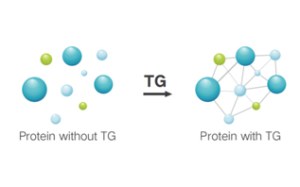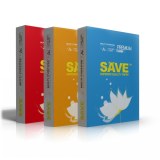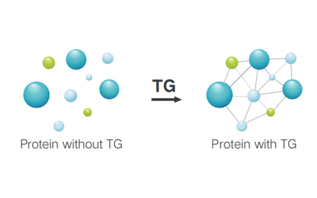Transglutaminase
Enzyme transglutaminase (TG) is a natural enzyme that crosslinks proteins together by linking the epsilon amino group of lysine in one protein to the carboxyl group of aspartic or glutamic acids in another protein. It is naturally present in the majority of organisms tissues and involved in various biological processes.
Our TG is fermented from streptoverticillium mobaraense and is characterized by strong binding force, good PH and thermal stability, impressive solubility, and most importantly, safety.
In commercial food processing, transglutaminase TG can perform as a binding agent and be applied in texture improvement, meat reconstruction and diary products. Transglutaminase uses in food is more common include steak, fish balls, surimi, ham, imitation crabmeat, etc. As a professional transglutaminase manufacturer, Yiming can provide you with high-quality transglutaminase in food at a reasonable price.
Mechanism
Optimum PH and Temperature
Key Benefits of Transglutaminase in Food
Natural and safe
Clean label
Wide application in food processing
Texture and juiciness improvement
Easy to operate
No additional additives or process required
No impact on taste or flavour
Models of Transglutaminase in Food
TG-B Standard Transglutaminase
TG-Y Liquid Transglutaminase
TG-H High Activity Transglutaminase
TG-MT Binding for Meat
TG-CK Binding for Poultry
TG-SF Binding for Seafood
TG-DR Transglutaminase for Dairy
Transglutaminase FAQs
Is enzyme TG safe?
TG is safe. It will not harm you or stick your hands. There are a lot of controversies about the safety of TG, while it has been recognized by the FDA as GRAS (Generally Recognized as Safe). It has been approved in the US, Japan, Europe and numerous other countries.
What are the storage conditions of TG enzyme?
TG has a limited shelf life as you deal with live enzymes. You need to keep it at cool temperatures or refrigerated until you use it. Once an enzyme is opened, you need to wrap it tightly and store it in the freezer.
What are the safety precautions when using TG?
As with many other food products, you need to be careful about thecross-contamination as you need to put meat outside when sticking meat, where usually has a higher content of bacteria. Chilled cuts may restrain the bacteria growth.
What are the regular transglutaminase uses?
Microbial transglutaminase can be used in red meat, poultry, sausages, meatballs, surimi products, fish meat, Chiba tofu, fresh cheese and yoghurt.
Personne à contacter : Dave Tong, +18 6 21 08 68 17
Bonne affaire : acheter au vendeur
Nous vous invitons à lire nos conditions générales d'utilisations. Vous pouvez aussi vous rendre sur nos FAQ et consulter notre page d'informations sur les risques liés à la contrefaçon.
|
Cette page concerne les importateurs et exportateurs de Transglutaminase Rechercher dans la catégorie : Alimentaire Rechercher dans la catégorie : transglutaminase |
Vendredi 09 janvier 2009
Services B2B Fini les nombreux interlocuteurs ! Vous recherchez un prestataire unique ? Un professionnel ? De confiance ? Du sérieux ? De la qualité ? De la réactivité ? Nous avons la solution : faites appel à FRET INTER ! FRET INTER Siège Social : 52 Boulevard Jeanne d'Arc 02200...
FRET INTER
- fretinter
- 02200 - SOISSONS
- +33 3 23 76 76 91
- 00333618881512
Vendredi 24 avril 2015
Quantité : 10 Kg - Prix : 180€
eirl NERA est une jeune entreprise (import-export) de négoce et commerce de gros en huiles essentielles, compléments alimentaires (Spiruline, … ), épices, arômates, divers produits biologiques d'agriculture venant essentiellement du continent africain et Madagascar. NERA se veut solidaire...
NERA
- 79200 - POMPAIRE
- 06 42 86 66 01
Mercredi 03 décembre 2014
Quantité : 1*20FCL
Merci, pour votre intérêt envers nos produits et notre groupe. Je suis Grace de SÄVE PAPER (Sweden), à l'avenir nous pourrons communiquer en français ou en anglais, selon ce qui vous conviendrait le mieux. Permettez-moi tout d'abord de vous présenter notre groupe en quelques lignes...
SÄVE PAPER AB
- 21125 - Malmö
- +46 4 06 66 95 45
- +46 7 04 57 15 26










